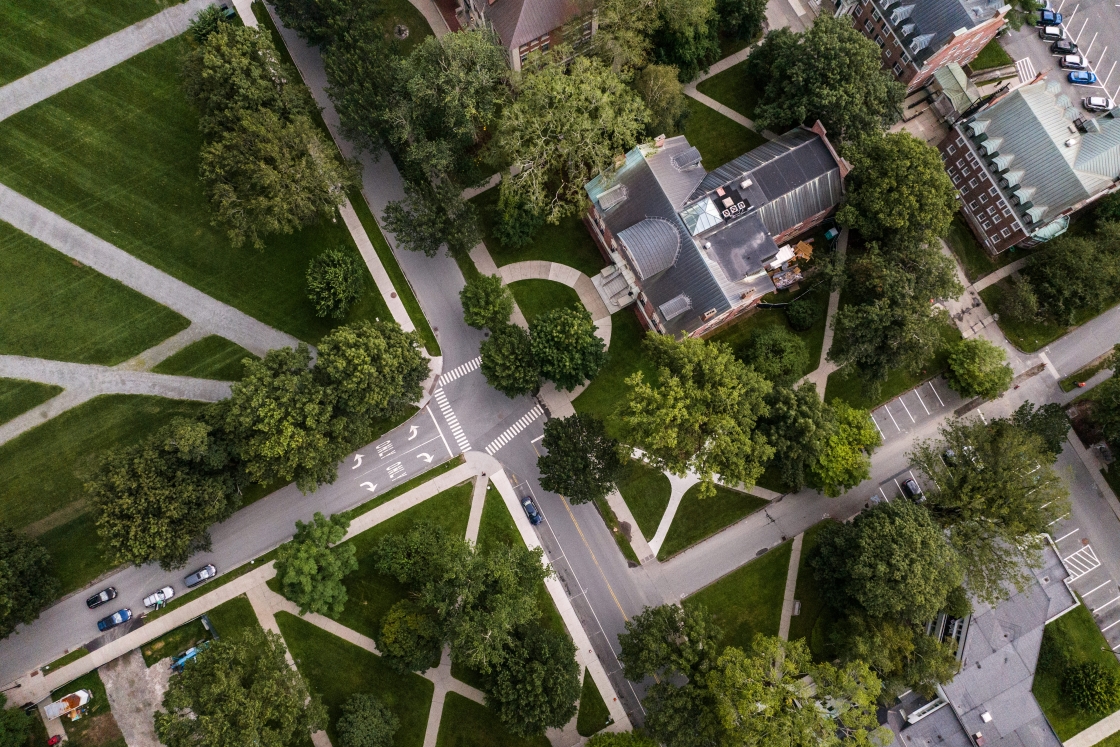Want an intensive assessment of your book manuscript? Thicken your skin and open your mind, says Yuliya Komska, assistant professor of German studies—and sign up, as she did, for a manuscript review seminar at the Leslie Center for the Humanities.
Unvarnished criticism of your work can be painful, but seminar participants agree: It’s worth it. Komska, whose forthcoming first book, The Icon Curtain: The Cold War’s Quiet Border (University of Chicago Press 2015), was reviewed by the seminar in 2012, says, “Feedback is a luxury, and this whole program is a privilege.”
“To have that many people read your work, take it seriously, discuss it, give you suggestions and advice—that doesn’t usually happen except here,” says Colleen Glenney Boggs, director of the Leslie Center.
Dean of the Faculty Michael Mastanduno developed the concept of the manuscript review when he was director of the John Sloan Dickey Center for International Understanding from 1997 to 2003. The program was so popular, says Boggs, that the Dickey Center began to collaborate with Leslie to help faculty with humanities projects. The Dickey Center still offers the program for manuscripts with an international scope.
Designed for faculty of any rank whose humanities manuscripts could benefit from revision, the Leslie seminars, which are supported in part through the Robert L. Swartz Fund, assemble a small panel of scholars across disciplines—from Dartmouth and beyond—to read and critique an author’s work. The seminars provide a crucial opportunity to take stock of a project’s potential in advance of publication. Since 2009 more than a dozen manuscripts reviewed through the program have gone on to be published.
“It’s especially important for people working on their first book, but we encourage faculty at all stages of their careers to participate,” says Boggs.
A scholar of 19th-century American literature, Boggs has firsthand experience of the process: She subjected the manuscripts of two of her books, including Animalia Americana: Animal Representations and Biopolitical Subjectivity (Columbia University Press 2013), to the seminar. “The panelists read the manuscript before they gather, and then we have three hours of discussion of the text and continue the conversation over dinner,” she says. “It is amazingly beneficial for the author.”
Associate Professor of Classics Pramit Chaudhuri’s first book, The War with God: Theomachy in Roman Imperial Poetry, was published by Oxford University Press in 2014 after a Leslie Center manuscript review seminar inspired him to radically revise his text.
“The seminar was transformative for my book,” Chaudhuri says. At the encouragement of seminar participants, he enlarged the scope of his project—doubling the size of his manuscript.
“It now offers a view of the majority of the classical epic and tragic traditions rather than just a slice,” he says. “I’m not sure I would have had the heart to take on such a task without the encouragement of experts in the field. There were times late at night when I cursed the seminar, to be sure, but all’s well that ends well!”
Komska, too, was inspired to revisit some of the frameworks of her book, which traces the history of the border between Czechoslovakia and West Germany. “I basically revised the book three times: once before the seminar, once after the seminar, and once after I heard from the publisher’s reviewers. And it is a better book for that.”
At the urging of seminar participants, Komska changed the title of her work. “They told me that my original title was ludicrous. I was at first very offended, but then at home I thought, there is something to it.”
A professor of geography on the panel encouraged her to submit the manuscript to a geography editor. “I would never have thought of that, but that’s what happened: It’s coming out as a geography book, cross-listed with cultural studies, sociology, and history,” she says. “I work interdisciplinarily, but one person can only push so far. You need thoughts from the outside to broaden your perspective. It was eye opening in a very productive way.”
Boggs says the seminars reflect the Leslie Center’s core mission to support research in the humanities. “There’s this myth that scholarship in the humanities means you sit by yourself with some books,” she says. “That’s an important and wonderful part of it, but it’s also important to have exchanges among scholars, sharing work, generating new ideas. The momentum from that can be significant. We support that in a number of different ways, including the manuscript review seminar.”
The seminar, says Komska, is “the friendliest way to get feedback. You can’t be rejected in a format like this—it’s just people taking stock of your ideas and telling you where they stand. That alone is like a therapy session. I think that’s great.”
Chaudhuri adds, “Ideally, the seminar would be available to any faculty member writing a book.”
Some Faculty Books that Have Benefited from Manuscript Review
- Amy Allen. The End of Progress: Rethinking the Normative Foundations of Critical Theory, Columbia University Press, 2015.
- Colleen Glenney Boggs. Animalia Americana: Animal Representations and Biopolitical Subjectivity, Columbia University Press, 2013.
- Pramit Chaudhuri. The War with God: Theomachy in Roman Imperial Poetry, Oxford University Press, 2014.
- Soyica Colbert. The African American Theatrical Body: Reception, Performance, and the Stage, Cambridge University Press, 2011.
- Aden Evens. Logic of the Digital, Bloomsbury Academic, 2015.
- Gerd Gemünden. Continental Strangers: German Exile Cinema, Columbia University Press, 2014.
- Yuliya Komska. The Icon Curtain: The Cold War’s Quiet Border, University of Chicago Press, 2015.
- Patricia McKee. Reading Constellations: Urban Modernity and Victorian Fiction, Oxford University Press, 2014.
- Klaus Mladek. Stages of Justice: The Philosophical Theater from Socrates to Arendt; in press; Northwestern University Press.
- Courtney K. Quaintance. Textual Masculinity and the Exchange of Women in Renaissance Venice, University of Toronto Press, Scholarly Publishing Division, 2015.
- Sam Vasquez. Humor in the Caribbean Literary Canon, New Caribbean Studies Series, Palgrave Macmillan, 2012.
